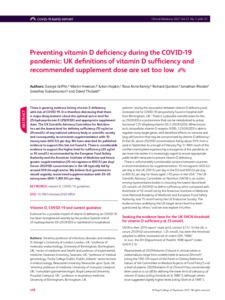Griffin, G; Hewison, M; Hopkin, J; Kenny, RA; Quinton, R; Rhodes, J; Subramanian, S; Thickett, D
(2021)
Preventing vitamin D deficiency during the COVID-19 pandemic: UK definitions of vitamin D sufficiency and recommended supplement dose are set too low.
Clin Med (Lond), 21 (1).
e48-e51.
ISSN 1473-4893
https://doi.org/10.7861/clinmed.2020-0858
SGUL Authors: Griffin, George Edward
![[img]](https://openaccess.sgul.ac.uk/113868/1.hassmallThumbnailVersion/e48.full.pdf)  Preview |
|
PDF
Published Version
Available under License ["licenses_description_publisher" not defined].
Download (177kB)
| Preview
|
Abstract
There is growing evidence linking vitamin D deficiency with risk of COVID-19. It is therefore distressing that there is major disagreement about the optimal serum level for 25-hydroxyvitamin D (25(OH)D) and appropriate supplement dose. The UK Scientific Advisory Committee for Nutrition has set the lowest level for defining sufficiency (10 ng/ml or 25 nmol/L) of any national advisory body or scientific society and consequently recommends supplementation with 10 micrograms (400 IU) per day. We have searched for published evidence to support this but not found it. There is considerable evidence to support the higher level for sufficiency (20 ng/ml or 50 nmol/L) recommended by the European Food Safety Authority and the American Institute of Medicine and hence greater supplementation (20 micrograms or 800 IU per day). Serum 25(OH)D concentrations in the UK typically fall by around 50% through winter. We believe that governments should urgently recommend supplementation with 20-25 micrograms (800-1,000 IU) per day.
| Item Type: |
Article
|
| Additional Information: |
© Royal College of Physicians 2021. All rights reserved. |
| Keywords: |
COVID-19, guidelines, vitamin D, COVID-19, Dietary Supplements, Dose-Response Relationship, Drug, Humans, Pandemics, SARS-CoV-2, Vitamin D, Vitamin D Deficiency, Vitamins, Humans, Vitamin D Deficiency, Vitamins, Vitamin D, Dose-Response Relationship, Drug, Dietary Supplements, Pandemics, COVID-19, SARS-CoV-2, vitamin D, COVID-19, guidelines, General Clinical Medicine, 1103 Clinical Sciences |
| SGUL Research Institute / Research Centre: |
Academic Structure > Infection and Immunity Research Institute (INII) |
| Journal or Publication Title: |
Clin Med (Lond) |
| ISSN: |
1473-4893 |
| Language: |
eng |
| Publisher License: |
Publisher's own licence |
| PubMed ID: |
33158957 |
| Web of Science ID: |
WOS:000712339500011 |
| Dates: |
| Date |
Event |
| 2021-01-21 |
Published |
| 2020-11-06 |
Published Online |
|
 |
Go to PubMed abstract |
| URI: |
https://openaccess.sgul.ac.uk/id/eprint/113868 |
| Publisher's version: |
https://doi.org/10.7861/clinmed.2020-0858 |
Statistics
Item downloaded times since 19 Nov 2021.
Actions (login required)
 |
Edit Item |



